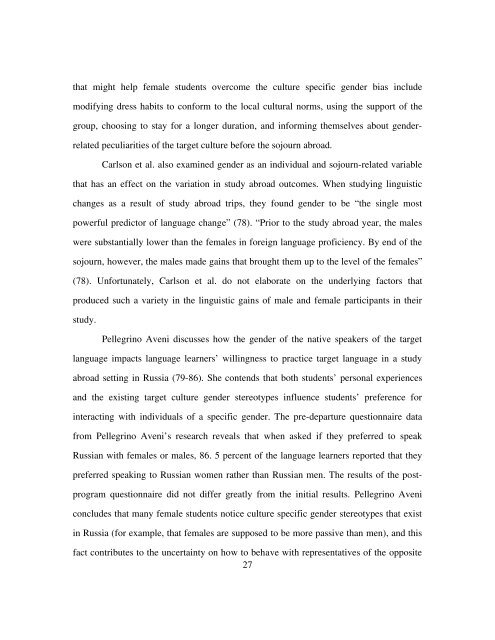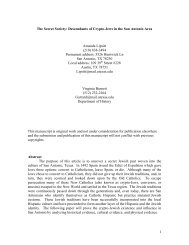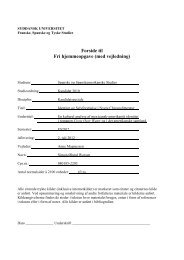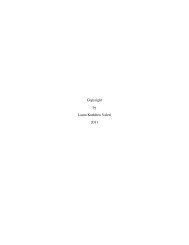Copyright by Tatiana Borisovna Segura 2008 - The University of ...
Copyright by Tatiana Borisovna Segura 2008 - The University of ...
Copyright by Tatiana Borisovna Segura 2008 - The University of ...
Create successful ePaper yourself
Turn your PDF publications into a flip-book with our unique Google optimized e-Paper software.
that might help female students overcome the culture specific gender bias include<br />
modifying dress habits to conform to the local cultural norms, using the support <strong>of</strong> the<br />
group, choosing to stay for a longer duration, and informing themselves about gender-<br />
related peculiarities <strong>of</strong> the target culture before the sojourn abroad.<br />
Carlson et al. also examined gender as an individual and sojourn-related variable<br />
that has an effect on the variation in study abroad outcomes. When studying linguistic<br />
changes as a result <strong>of</strong> study abroad trips, they found gender to be “the single most<br />
powerful predictor <strong>of</strong> language change” (78). “Prior to the study abroad year, the males<br />
were substantially lower than the females in foreign language pr<strong>of</strong>iciency. By end <strong>of</strong> the<br />
sojourn, however, the males made gains that brought them up to the level <strong>of</strong> the females”<br />
(78). Unfortunately, Carlson et al. do not elaborate on the underlying factors that<br />
produced such a variety in the linguistic gains <strong>of</strong> male and female participants in their<br />
study.<br />
Pellegrino Aveni discusses how the gender <strong>of</strong> the native speakers <strong>of</strong> the target<br />
language impacts language learners’ willingness to practice target language in a study<br />
abroad setting in Russia (79-86). She contends that both students’ personal experiences<br />
and the existing target culture gender stereotypes influence students’ preference for<br />
interacting with individuals <strong>of</strong> a specific gender. <strong>The</strong> pre-departure questionnaire data<br />
from Pellegrino Aveni’s research reveals that when asked if they preferred to speak<br />
Russian with females or males, 86. 5 percent <strong>of</strong> the language learners reported that they<br />
preferred speaking to Russian women rather than Russian men. <strong>The</strong> results <strong>of</strong> the post-<br />
program questionnaire did not differ greatly from the initial results. Pellegrino Aveni<br />
concludes that many female students notice culture specific gender stereotypes that exist<br />
in Russia (for example, that females are supposed to be more passive than men), and this<br />
fact contributes to the uncertainty on how to behave with representatives <strong>of</strong> the opposite<br />
27

















